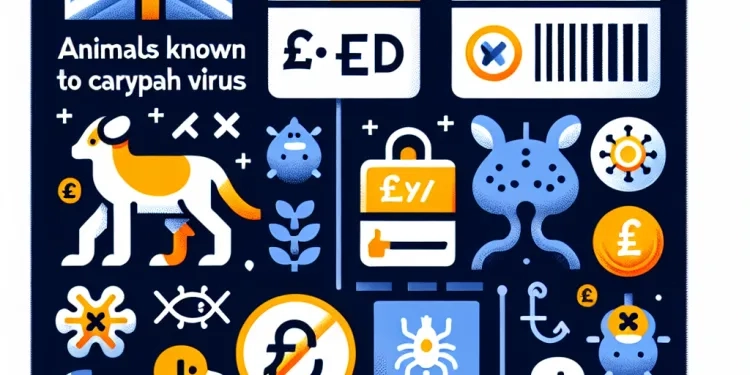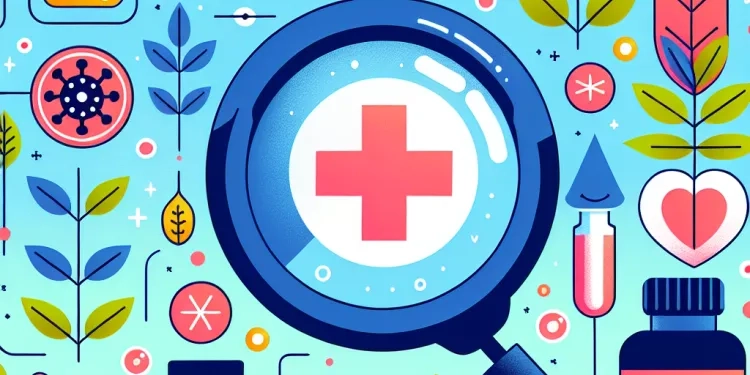
Find Help
More Items From Ergsy search
-

Is there a cure for Nipah Virus?
Relevance: 100%
-

What is Nipah Virus?
Relevance: 75%
-

How is Nipah Virus diagnosed?
Relevance: 69%
-

How is Nipah Virus transmitted?
Relevance: 68%
-

Where was Nipah Virus first identified?
Relevance: 68%
-

Can Nipah Virus cause outbreaks?
Relevance: 67%
-

What are the symptoms of Nipah Virus infection?
Relevance: 66%
-

Can Nipah Virus cause neurological complications?
Relevance: 65%
-

Which animals are known to carry Nipah Virus?
Relevance: 65%
-

What is the mortality rate of Nipah Virus infection?
Relevance: 64%
-

What global organizations are involved in Nipah Virus research?
Relevance: 63%
-

Has a vaccine been developed against Nipah Virus?
Relevance: 63%
-

How is Nipah Virus controlled during outbreaks?
Relevance: 63%
-

Can Nipah Virus be transmitted from person to person?
Relevance: 62%
-

What should someone do if they suspect Nipah Virus infection?
Relevance: 62%
-

What regions are most at risk for Nipah Virus outbreaks?
Relevance: 61%
-

What role do fruit bats play in Nipah Virus transmission?
Relevance: 61%
-

Why are Nipah Virus outbreaks considered a public health concern?
Relevance: 60%
-

What preventive measures can reduce the risk of Nipah Virus infection?
Relevance: 59%
-

Is there a cure for cold sores?
Relevance: 38%
-

Is there a way to cure a cold quickly?
Relevance: 36%
-

What is Nipah Virus?
Relevance: 35%
-

Is there a cure for ADHD?
Relevance: 33%
-

Is there a cure for eczema?
Relevance: 32%
-

Can HIV be cured?
Relevance: 32%
-

Is there a cure for psoriasis?
Relevance: 32%
-

Can autism be cured?
Relevance: 32%
-

Is there a cure for dementia?
Relevance: 32%
-

Can tinnitus be cured?
Relevance: 31%
-

Can asthma be cured?
Relevance: 31%
-

Can sleep apnea be cured?
Relevance: 31%
-

Can Huntington's disease be cured?
Relevance: 30%
-

Is there a cure for Crohn's disease?
Relevance: 30%
-

Is the Marburg virus related to the Ebola virus?
Relevance: 30%
-

What is the principle of 'like cures like'?
Relevance: 29%
-

Is there a cure for motor neurone disease?
Relevance: 29%
-

Is there a cure for nut allergies?
Relevance: 29%
-

Can Chikungunya virus infection be treated?
Relevance: 28%
-

What is the Marburg Virus?
Relevance: 27%
-

Is there a vaccine for Marburg virus?
Relevance: 27%
Understanding the Nipah Virus
The Nipah virus is a zoonotic virus, meaning it is transmitted from animals to humans. It can also be transmitted through contaminated food or directly between people. The natural hosts for this virus are fruit bats of the Pteropodidae family, which can transmit the virus to other animals and humans. Outbreaks of Nipah virus have been reported primarily in South and Southeast Asia, with a notable instance in Kerala, India, and Bangladesh.
Symptoms and Risks
Individuals infected with the Nipah virus may experience a range of symptoms including fever, headache, drowsiness, respiratory issues, and even brain swelling. As the infection progresses, it can lead to encephalitis (inflammation of the brain), often resulting in coma within 24 to 48 hours. The mortality rate for Nipah virus infections is estimated to be between 40% and 75%, depending significantly on local capabilities for epidemiological surveillance and clinical management.
Is There a Cure for the Nipah Virus?
As of now, there is no specific antiviral treatment or licensed vaccines available for Nipah virus infection. The primary treatment for those infected is supportive care, which includes managing symptoms and complications. This might involve measures like administering intravenous fluids, airway protection, and treatment of fever. Research is ongoing, aimed at developing effective antiviral therapies and vaccines to combat the disease. Some experimental treatments, including monoclonal antibodies and antiviral drugs, are being investigated, but their safety and efficacy have not been entirely confirmed yet.
Preventive Measures
Given the absence of a cure, preventive strategies are essential. These include practicing good personal hygiene, ensuring that food is thoroughly cooked and avoiding exposure to bats and pigs in endemic areas. Public health education plays a critical role in alerting communities about the risks of the virus and how to minimize the chances of transmission. Health authorities prioritize human and animal surveillance to limit the impact of potential outbreaks. Quarantine and isolation of suspected cases also help contain the virus’s spread.
The Global Response and Future Directions
The World Health Organization and other global health bodies urge continuous research into the Nipah virus, highlighting the need for enhanced efforts toward vaccine and treatment development. Collaborative research initiatives and funding have increased to find sustainable solutions. Understanding the ecology and transmission dynamics of the virus is crucial for developing effective control strategies. Monitoring and preparedness are critical, given the potential of the Nipah virus to spark new outbreaks.
Understanding the Nipah Virus
The Nipah virus is a germ that can spread from animals to people. It can also spread through bad food or from one person to another. Big bats called fruit bats carry this virus. These bats can give the virus to other animals and people. There have been outbreaks of Nipah virus mainly in places like South and Southeast Asia, such as Kerala in India and Bangladesh.
Symptoms and Risks
If someone has the Nipah virus, they might feel sick with fever, a headache, or feel sleepy. They might have trouble breathing, and their brain might swell. This can make a person go into a coma, which means they are unconscious, in one or two days. Many people who get the Nipah virus can die from it. Between 4 and 7 out of every 10 people who get it might die. It depends on how good the hospitals are at taking care of the sick people.
Is There a Cure for the Nipah Virus?
Right now, there is no special medicine to cure Nipah virus, and there are no approved vaccines to stop it. The main way to help sick people is through supportive care. This means treating the symptoms, like giving fluids, making sure they can breathe well, and dealing with fever. Scientists are working hard to find good medicines and vaccines. Some new treatments are being tested to see if they work safely, like special antibodies and new drugs, but they are not ready yet.
Preventive Measures
Because there is no cure, it is important to try not to get the virus in the first place. People should wash their hands well, cook food properly, and stay away from bats and pigs in areas where the virus is common. Teaching people about the virus and how to avoid it is very important. Health workers keep a close watch on people and animals to stop the virus from spreading. Isolating people who might be sick helps stop others from getting the virus.
The Global Response and Future Directions
The World Health Organization and other health groups are working together to study the Nipah virus. They are trying hard to make new vaccines and treatments. More money and research are being put into finding long-term solutions. It is important to understand how the virus spreads and how it affects people and animals. Watching for new cases and being ready to act quickly is very important because the Nipah virus can cause new outbreaks.
Frequently Asked Questions
What is the Nipah virus?
Nipah virus is a zoonotic virus, meaning it can be transmitted from animals to humans, as well as through contaminated food or directly between people.
Is there a cure for Nipah virus?
As of now, there is no specific cure or antiviral treatment for Nipah virus infection. Treatment is mainly supportive.
What are the symptoms of Nipah virus infection?
Symptoms include fever, headache, vomiting, and respiratory issues. Severe cases can lead to encephalitis, coma, and death.
How is Nipah virus transmitted?
Nipah virus can be transmitted from fruits contaminated by infected bats, infected animals, or through person-to-person contact.
How can Nipah virus infection be prevented?
Avoiding exposure to bats and pigs, practicing good hygiene, and avoiding eating fruits that may be contaminated by animals can help prevent infection.
Is there a vaccine for Nipah virus?
Currently, there is no vaccine available for Nipah virus, though research is ongoing to develop one.
What is the mortality rate of Nipah virus?
The mortality rate for Nipah virus is estimated to be between 40% and 75%, but this can vary depending on the outbreak.
What animals are carriers of Nipah virus?
Fruit bats, particularly the species Pteropus, are the natural hosts and carriers of Nipah virus.
Where have Nipah virus outbreaks occurred?
Outbreaks have occurred in Malaysia, Singapore, Bangladesh, and India.
Can Nipah virus cause encephalitis?
Yes, severe infection can lead to encephalitis, which is inflammation of the brain.
How is Nipah virus diagnosed?
Nipah virus infection can be diagnosed through real-time polymerase chain reaction (RT-PCR) from throat and nasal swabs, cerebrospinal fluid, urine, and blood.
What supportive treatments are available for Nipah virus?
Supportive treatments include managing fever, dehydration, and neurological symptoms.
What is the incubation period for Nipah virus?
The incubation period for Nipah virus ranges from 4 to 14 days.
Why is developing a Nipah virus vaccine challenging?
Vaccine development is challenging due to limited market incentives, sporadic outbreaks, and the complexity of the virus.
How can public health systems respond to Nipah virus outbreaks?
Response includes surveillance, rapid diagnosis, isolation of infected individuals, and informing the public.
Are there any antiviral drugs effective against Nipah virus?
While some experimental antiviral treatments are under investigation, there are currently no approved antiviral drugs for Nipah virus.
Can Nipah virus be transmitted human-to-human?
Yes, human-to-human transmission of Nipah virus has been documented, particularly in healthcare settings.
Why is awareness important in preventing Nipah virus outbreaks?
Awareness helps individuals avoid exposure to infected animals and contaminated food, reducing transmission risks.
What role do bats play in Nipah virus transmission?
Bats are natural reservoirs of the Nipah virus and can transmit it through their saliva, urine, and feces.
Are there any long-term effects of surviving a Nipah virus infection?
Survivors may experience long-term neurological complications, but more research is needed to fully understand these effects.
What is the Nipah Virus?
The Nipah virus is a sickness caused by germs. It can make people very sick.
If you want to understand more, you can:
- Look at easy-to-read websites.
- Watch videos for kids about germs and staying healthy.
- Ask an adult to explain it with simple words.
The Nipah virus is a type of germ that can make people sick. It can spread from animals to people. It can also spread if you eat food that has the virus on it or if someone who has the virus gives it to another person.
If you need help reading, you can try using audiobooks or reading together with someone. You can also ask someone to explain things you find tricky.
Can Nipah virus be fixed?
Right now, there is no special medicine to cure Nipah virus. Doctors help people feel better with supportive care.
What happens if you get the Nipah virus?
If you catch the Nipah virus, you might feel very sick. Here are some signs:
- Fever
- Headache
- Dizziness
- Feeling very tired
- Vomiting (feeling like you need to throw up)
- Trouble breathing
If you have any of these signs, tell an adult or a doctor.
Reading tools like audiobooks or reading apps can help you.
If you are sick, you might have a fever, a headache, feel like throwing up, or have trouble breathing. If it gets very bad, it could cause the brain to swell, make you go into a coma, or even cause death.
For help, try using picture charts to show symptoms, or talk with someone who understands and can explain it to you. It’s important to ask an adult or a doctor for help if you feel any of these symptoms.
How do people get the Nipah virus?
People can catch the Nipah virus in a few ways:
- By touching an animal that is sick, like a bat or pig.
- By eating fruit that a sick animal has touched.
- By being near someone who has the virus and is coughing or sneezing.
If you are worried, talk to a doctor or nurse.
To stay safe, you can use these tips:
- Wash your hands often with soap.
- Avoid touching or eating fruit that has bite marks or looks bad.
- Stay away from sick animals and people.
If reading is hard, try using pictures to help understand. You can also ask someone you trust to read with you.
You can catch Nipah virus from:
- Fruits that sick bats have touched.
- Sick animals.
- Being close to someone who is sick with Nipah.
Here are some things that can help you:
- Wash fruits well before you eat them.
- Stay away from sick animals.
- Wash your hands often.
- If someone is sick, try to keep some distance.
How can we stop Nipah virus infection?
The Nipah virus is a germ that makes people very sick. It can spread from animals to people, and from people to people. Here are some tips to help you stay safe:
- Wash your hands: Wash your hands often with soap and water. This helps remove germs.
- Avoid sick animals: Stay away from animals that seem sick, especially bats and pigs.
- Cook food well: Make sure food is cooked properly, especially if it comes from animals.
- Stay away from sick people: If someone is sick with Nipah, try not to be close to them.
- Talk to a doctor: If you feel unwell, go to the doctor quickly.
Use a calendar to remind you to wash your hands or talk to someone you trust if you need help understanding these tips.
To stay healthy, do these things:
- Keep away from bats and pigs.
- Wash your hands often.
- Don't eat fruits if animals have touched them.
These steps can help keep you safe from getting sick.
Is there a vaccine for Nipah virus?
No, there is no vaccine for Nipah virus right now.
To stay safe, people can:
- Wash their hands often with soap and water.
- Avoid contact with sick people and animals.
- Only drink fruit juice if it's been boiled.
- Wear gloves if helping someone who is sick.
If you want more help, you can:
- Ask a doctor or nurse for advice.
- Read easy books about health for more tips.
Right now, there is no shot to stop the Nipah virus, but people are working hard to make one.
How dangerous is the Nipah virus?
The Nipah virus can make people very sick. It can cause many people to die. If 100 people get sick from the Nipah virus, 40 to 75 of them might die.
Here's a tool to help:
- Talk to an adult: If you have questions, ask a grown-up for help.
- Use pictures: Look for pictures or videos that explain the Nipah virus.
The chance of dying from Nipah virus is between 40% and 75%. This means 40 to 75 people out of 100 might die from it. But this can change when there are different outbreaks.
What animals can carry the Nipah virus?
Some animals can have the Nipah virus. Here are some of them:
- Bats, especially fruit bats
- Pigs
If you want to know more or if this is tricky to read, you can ask a friend or family member to help. It's also good to use apps that can read words out loud. They make it easier to understand.
Fruit bats carry a virus called Nipah. These bats are from a group called Pteropus.
Where has the Nipah virus happened?
The Nipah virus has made people sick in some places. It has happened in: - **Bangladesh.** Many people got sick here. - **India.** People have also gotten sick here. - **Malaysia.** There were cases here too. - **Singapore.** Some people got sick here. If you want to learn more or need help understanding, you can: - Use pictures or maps to see where these places are. - Talk to someone who can explain it to you. - Use simple videos that talk about Nipah virus.Sickness happened in four places. These places are Malaysia, Singapore, Bangladesh, and India.
Can Nipah virus make the brain swell?
Nipah virus is a germ that can make people very sick.
One way it can make you sick is by making your brain swell up. This is called encephalitis.
If you have questions or don't feel well, it's important to talk to a doctor or nurse.
Using pictures and videos can help you understand more about the Nipah virus.
Yes, a really bad infection can make the brain swell up. This is called encephalitis.
How do doctors know if someone has the Nipah virus?
Doctors use tests to find out if someone has the Nipah virus. They take a blood sample or a sample from the throat.
If you want help with reading, you can use tools like picture books or ask someone to read to you.
If you need more help, ask someone like a teacher or a doctor to explain it to you.
Doctors can find out if someone has Nipah virus by using a test. They check samples of spit from the nose and throat, fluid from around the brain, pee, and blood.
What treatments can help with Nipah virus?
You can feel better with some helpful treatments.
These treatments can help if you have a fever (when your body is too hot), if you are thirsty because you don't have enough water, and if you have problems with your brain.
Some tools or techniques to help are:
- Drink lots of water if you are thirsty.
- Use a cool cloth or take medicine if you have a fever.
- Ask a doctor or nurse for help if you have trouble with your brain.
How long does it take to get sick after catching Nipah virus?
The time it takes for a person to show signs of being sick after they get the Nipah virus is usually between 4 to 14 days.
Why is it hard to make a Nipah virus vaccine?
Making a Nipah virus vaccine is tough. Here’s why:
- The Nipah virus is rare. This means fewer people can help test new vaccines.
- This virus changes over time. Changes make it harder to create a vaccine that always works.
- Special labs are needed. Handling the Nipah virus is dangerous, so we need special places to work on it.
Some ways to help:
- Simple videos: Watch videos that explain the Nipah virus. Visuals help you understand better.
- Easy questions: After reading, ask yourself questions to check what you remember.
Making vaccines is hard. There are only a few reasons for companies to make them, which means they might not make much money. Diseases can come and go, so it's tricky to know when to make a vaccine. Also, viruses can be very complicated.
Some tools that might help understand this better include using picture books or videos about how vaccines are made, and having a teacher or helper explain it with simple words.
What can public health systems do when Nipah virus spreads?
Public health systems are like the doctors and helpers for everyone in a town or city. They keep us safe and healthy. When the Nipah virus spreads, they have a plan to help.
Here are some things they do:
- Watch for people who get sick. This helps them find the virus early.
- Tell people how to stay safe, like washing hands and avoiding sick animals.
- Help doctors know how to treat people with the virus.
- Work with other health teams to stop the virus from spreading.
If you want to know more or need help understanding, you can:
- Ask a teacher or adult to explain.
- Find books or videos about the Nipah virus made for children.
We need to watch out, find sickness fast, keep sick people away from others, and tell everyone what's happening.
Can medicine help fight the Nipah virus?
Some medicine might help fight the Nipah virus.
Doctors are still learning about it.
Talk to a doctor if you want to know more.
You can use pictures or videos to help understand more.
Right now, there are no medicines that doctors say can definitely stop Nipah virus. Scientists are still trying out some new treatments to see if they work.
Can people spread Nipah virus to each other?
Yes, the Nipah virus can be spread from one person to another person.
Wash your hands often, wear a mask, and stay away from sick people to stay safe.
If you have questions, talking to a doctor can help you understand more.
Yes, people can pass the Nipah virus to each other. This often happens in hospitals.
Why should we know about the Nipah virus?
Knowing about the Nipah virus helps keep people safe. When we learn about it, we can stop it from spreading.
Here are some ways to stay informed and safe:
- Watch TV and listen to the news for any information about the virus.
- Read simple guides or leaflets about how to stay healthy.
- Talk to doctors or nurses if you have questions.
- Join community meetings about health and safety.
Support tools like picture guides or apps that read text aloud can help.
Knowing how to stay safe can help people avoid getting sick from animals or bad food. This can stop the spread of germs.
How do bats help spread the Nipah virus?
Bats can carry the Nipah virus. They can spread it through their spit, pee, and poop.
What happens after you get better from the Nipah virus?
If you get sick from the Nipah virus and then get better, you might still have some problems later. It is a good idea to see a doctor to help make sure you stay healthy.
You can use pictures, videos, or talk to someone who knows about the Nipah virus to help you understand more.
People who get better from the illness might still have problems with their brain for a long time. However, scientists need to do more studies to clearly understand these problems.
Useful Links
This website offers general information and is not a substitute for professional advice.
Always seek guidance from qualified professionals.
If you have any medical concerns or need urgent help, contact a healthcare professional or emergency services immediately.
Some of this content was generated with AI assistance. We’ve done our best to keep it accurate, helpful, and human-friendly.
- Ergsy carfully checks the information in the videos we provide here.
- Videos shown by Youtube after a video has completed, have NOT been reviewed by ERGSY.
- To view, click the arrow in centre of video.
- Most of the videos you find here will have subtitles and/or closed captions available.
- You may need to turn these on, and choose your preferred language.
- Go to the video you'd like to watch.
- If closed captions (CC) are available, settings will be visible on the bottom right of the video player.
- To turn on Captions, click settings .
- To turn off Captions, click settings again.
More Items From Ergsy search
-

Is there a cure for Nipah Virus?
Relevance: 100%
-

What is Nipah Virus?
Relevance: 75%
-

How is Nipah Virus diagnosed?
Relevance: 69%
-

How is Nipah Virus transmitted?
Relevance: 68%
-

Where was Nipah Virus first identified?
Relevance: 68%
-

Can Nipah Virus cause outbreaks?
Relevance: 67%
-

What are the symptoms of Nipah Virus infection?
Relevance: 66%
-

Can Nipah Virus cause neurological complications?
Relevance: 65%
-

Which animals are known to carry Nipah Virus?
Relevance: 65%
-

What is the mortality rate of Nipah Virus infection?
Relevance: 64%
-

What global organizations are involved in Nipah Virus research?
Relevance: 63%
-

Has a vaccine been developed against Nipah Virus?
Relevance: 63%
-

How is Nipah Virus controlled during outbreaks?
Relevance: 63%
-

Can Nipah Virus be transmitted from person to person?
Relevance: 62%
-

What should someone do if they suspect Nipah Virus infection?
Relevance: 62%
-

What regions are most at risk for Nipah Virus outbreaks?
Relevance: 61%
-

What role do fruit bats play in Nipah Virus transmission?
Relevance: 61%
-

Why are Nipah Virus outbreaks considered a public health concern?
Relevance: 60%
-

What preventive measures can reduce the risk of Nipah Virus infection?
Relevance: 59%
-

Is there a cure for cold sores?
Relevance: 38%
-

Is there a way to cure a cold quickly?
Relevance: 36%
-

What is Nipah Virus?
Relevance: 35%
-

Is there a cure for ADHD?
Relevance: 33%
-

Is there a cure for eczema?
Relevance: 32%
-

Can HIV be cured?
Relevance: 32%
-

Is there a cure for psoriasis?
Relevance: 32%
-

Can autism be cured?
Relevance: 32%
-

Is there a cure for dementia?
Relevance: 32%
-

Can tinnitus be cured?
Relevance: 31%
-

Can asthma be cured?
Relevance: 31%
-

Can sleep apnea be cured?
Relevance: 31%
-

Can Huntington's disease be cured?
Relevance: 30%
-

Is there a cure for Crohn's disease?
Relevance: 30%
-

Is the Marburg virus related to the Ebola virus?
Relevance: 30%
-

What is the principle of 'like cures like'?
Relevance: 29%
-

Is there a cure for motor neurone disease?
Relevance: 29%
-

Is there a cure for nut allergies?
Relevance: 29%
-

Can Chikungunya virus infection be treated?
Relevance: 28%
-

What is the Marburg Virus?
Relevance: 27%
-

Is there a vaccine for Marburg virus?
Relevance: 27%


